How Far Should a Generator Be From the House? Reasons, Factors, & FAQ
-
Greg Iacono
- Last updated:
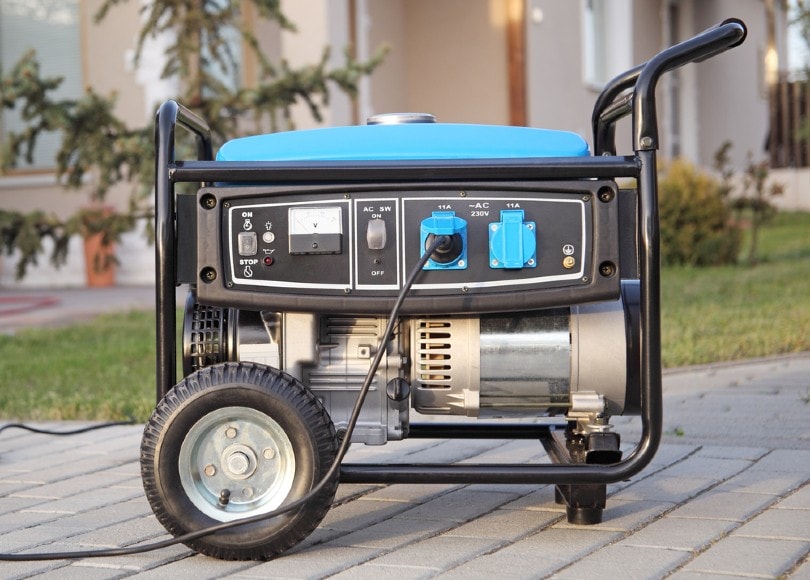
Generators can be invaluable in many distressing situations, like when your town is experiencing a black-out or brownout or was just hit by a major storm or hurricane. In those situations, having a generator on-hand will provide the electricity you need to make your family’s life (almost) normal again.
One drawback to generators, however, is that they produce deadly carbon monoxide gas when operating. Therefore, it’s highly recommended that you place your generator outside, away from your home. Knowing this safety risk, one question many folks ask is how far should a generator be from the house?
According to Consumer Reports, the well-respected product testing and review magazine, your generator should be at least 20 feet away from your house. Also, while in use, you should point the generator’s exhaust (and its deadly carbon monoxide) away from your home.
If you have more questions about generator safety and best practices for using a generator, the information below is for you.
 Can You Put a Generator Next to Your House?
Can You Put a Generator Next to Your House?
There are two types of generators: portable generators and whole-house generators. The former is the most common type of generator and is used by many families to produce electricity after a storm or power outage. Portable generators are not permanently installed and can be placed in front, back, or on the side of your home when in use. As we learned, wherever you place your portable generator, it should be at least 20 feet away from your home.
A whole-house generator is a permanent large appliance typically installed by an HVAC expert. Since they are permanently installed, whole-house generators are considered safer and can be placed closer to your home. Experts recommend a distance of 1.5 feet at least, but you should check your local building codes before installation as the rules and regulations might be different.
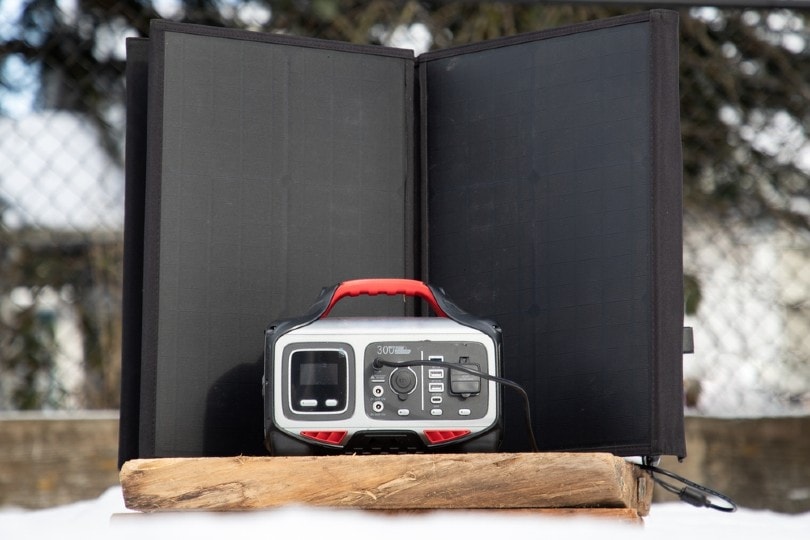
How Far Does a Portable Generator Need To Be From a Window?
Just as a portable generator needs to be 20 feet away from your home, it should be at least the same distance from any windows or doors. Optimally, your generator should be in an open space with nothing within 20 feet, including your house, shed, outdoor furniture, swimming pool, etc. This distance will reduce the risk of carbon monoxide poisoning, fire hazards, electrical shock risk, etc.
How Close Can a Generator Be to an AC Unit?
Since most AC and HVAC units are typically within 5 feet of a house, placing a generator near them is not recommended. However, if your AC unit is further than 20 feet from your home, your generator should be no less than 3 feet from it. The same goes for utility meters and any other serviceable large appliances.
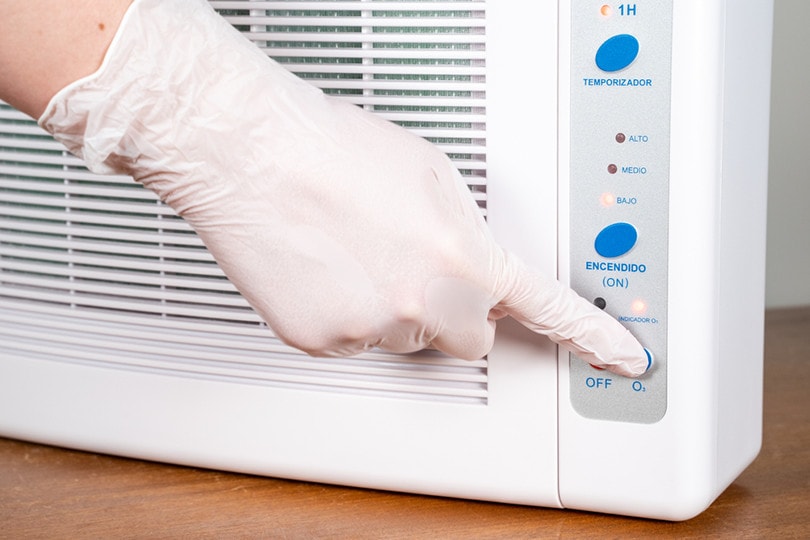
Can I Run My Generator on the Porch?
Running your generator anywhere in or on your home is highly discouraged. That includes a porch, patio, shed, garage, or sitting area of any kind. The dangers posed by a portable generator are simply too great. Even in an open area, carbon monoxide can accumulate enough to be a major health hazard. Plus, the threat of fire if your generator somehow falls over is very high. That’s why keeping generators 20 feet from your home is the recommended minimum safe distance.
Can a Generator Run in the Rain?
Here the difference between a portable generator and a whole-house generator needs to be addressed once again. With a portable generator, running in the rain is unsafe unless it’s sufficiently covered. Portable generators create a very high, powerful voltage when in use. If the outlet gets wet or water can seep into the generator’s engine, the chance of electrocution or an explosion is exceptionally high. If you’re forced to run your portable generator in the rain, a cover specifically designed to keep it dry is a must.
On the other hand, you can run a whole-house generator in the rain with minimal risk. Whole-house generators typically have their own housing unit that covers them completely. They are also hard-wired, so there’s no electrical outlet to get wet. Also, whole-house generators are fixed in position, so the chance they fall over and start a fire is very low.

Can You Store a Generator in the Garage?
Like most gasoline-powered appliances and tools, storing your generator in the garage should be no problem. The gas tank should be firmly closed so that no gas can escape, and it needs to be stored upright. If gas is in the tank, you must keep your generator at least 50 feet from open flames or heat-generating devices like a water heater. Adding a fuel stabilizer to the gas tank is also recommended.
Can You Cover a Generator With a Tarp When It’s Raining?
While you can cover a generator with a tarp while using it in the rain, it’s recommended to cover it with a cover specifically designed to keep it dry. With a tarp, there’s too much risk that it won’t cover your generator well enough to keep it completely dry. For example, it could fill with water, come unhooked, or blow away in a high wind.
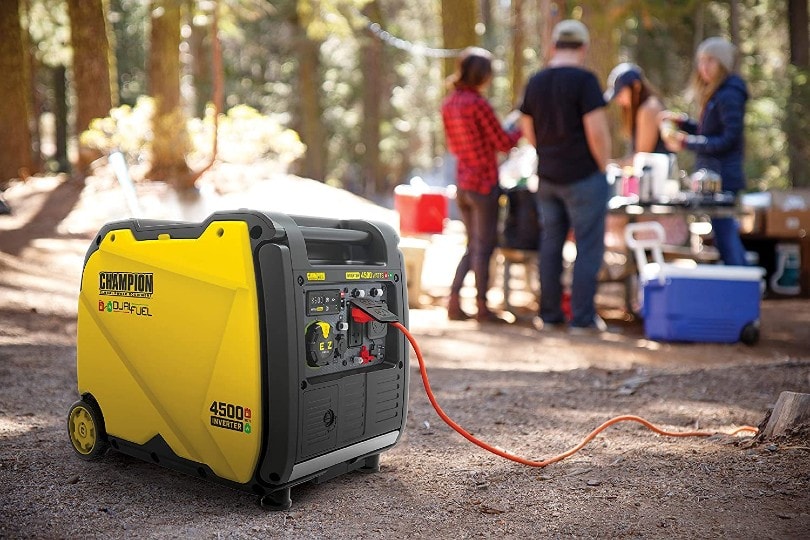
Which Is Better, a Full Cover or a Running Cover?
There are two basic generator cover types: a full cover and a running cover. The best choice depends on several factors, but, in most cases, a running cover is best. That’s because a full cover usually doesn’t provide holes for airflow, which could lead to a dangerous backup of carbon monoxide while in use. Also, full covers usually don’t provide access to their controls and outlets.
As their name suggests, running covers can and should be used when you run your generator in the rain, and any time you run them. Even if it’s sunny, the weather can always change. In short, having a running cover in place 24/7 is the best choice to keep your generator (and your family) safe, no matter the weather.
Can You Run a Generator During a Storm?
While there are risks associated with running generators during a storm, storm usage is precisely what they were made for. Being prepared is essential when using a generator so that, if needed, you can run it during a storm with minimal risk.
- Keep the generator at least 20 feet from your home.
- Use a running cover that protects it from the weather.
- Use heavy-duty extension cords with three prongs (not two).
- Have a transfer switch installed to connect your generator directly to your home’s circuit breaker panel.
- Never back-feed your generator into your home’s electrical wiring. Back-feeding is when you plug the generator into an electrical outlet, and it is extremely dangerous.
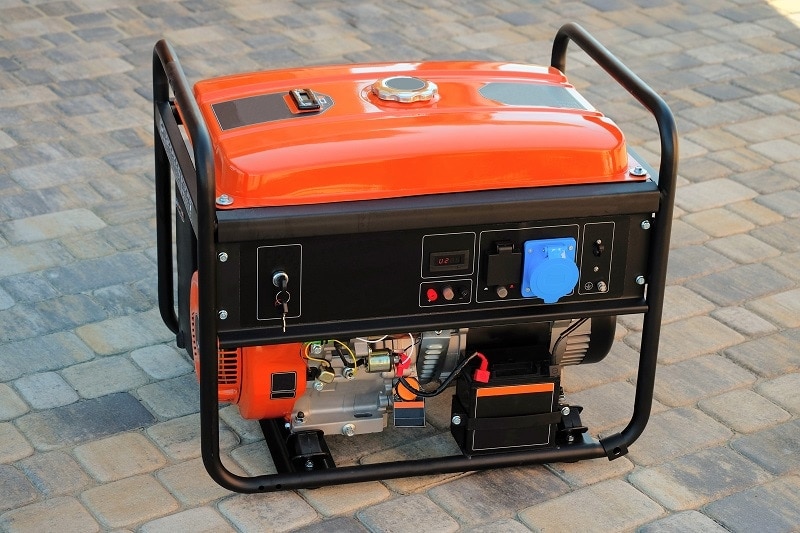
Can a Generator Run in the Sun?
While you can run a generator in the sun, it’s better to cover it so it stays cooler. The problem is that a generator already creates a tremendous amount of heat. The extra heat could cause your generator to overheat and shut down if it’s hot and sunny. It could also fry some of the generator’s components, leading to expensive repairs. A running cover will be a good choice if the sun is blazing when you need to use your generator.
Final Thoughts
How far should a generator be from the house? As we’ve seen, a portable generator should be at least 20 feet from your home to reduce the risk of carbon monoxide poisoning, fire, and electrocution. A whole-house, permanently installed, and hard-wired generator, however, should be 1.5 feet away, minimally. Although meant to be used during inclement weather, it’s highly recommended that you purchase a running cover for your generator to protect it from the elements.
If you follow the safety tips and recommendations we’ve given, you, your family, and your home will stay safer when using your generator. More importantly, you’ll have the electricity you need to get by until your local utility company gets the power flowing again.
Featured Image Credit: canoniroff, Shutterstock
Contents
 Can You Put a Generator Next to Your House?
Can You Put a Generator Next to Your House?